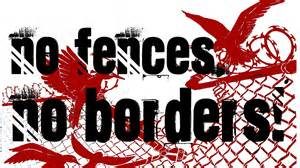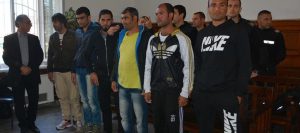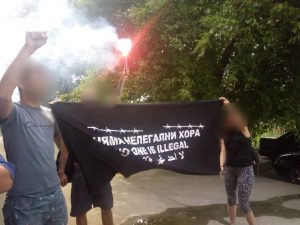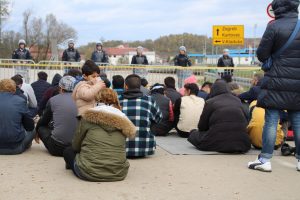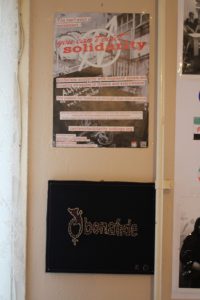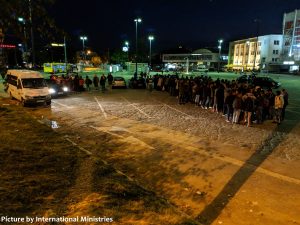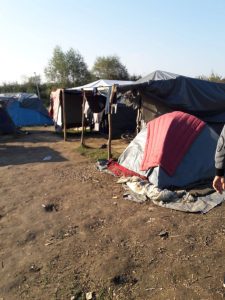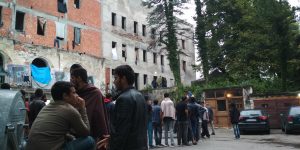A report by the Legal Center Lesbos (http://legalcentrelesvos.org/2018/11/29/the-case-of-the-moria-35-a-15-month-timeline-of-injustice-and-impunity):
Updates and 15-month history of trial to the case of the Moria35 from 2018 and 2017:
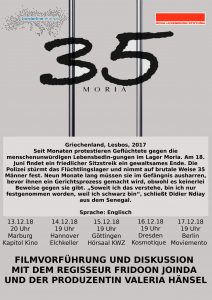
29th November 2018
On Thursday 18th October, the last of the Moria 35 were released from detention. Their release comes one year and three months – to the day – after the 35 men were arbitrarily arrested and subject to brutal police violence in a raid of Moria camp following peaceful protests, on July 18th 2017.
While the Legal Centre Lesbos welcomes the fact that all 35 men have finally been released, we maintain that none of them should ever have been imprisoned to begin with –– let alone for the 10 to 15 months the majority of the Moria 35 spent in punitive, unlawful incarceration.
And while freedom from unjust imprisonment is one thing, freedom in any
broader sense is a different matter. The legal status of all 35 men is
precarious. Six of them have been granted asylum in Greece, but the
majority are now fighting the rejection of their asylum cases; on appeal
or through subsequent applications which are subject to admissibility.
Three individuals have been deported. One individual was illegally
deported without having exhausted his legal remedies in Greece, while
another individual, having spent 9 months in pre-trial detention only to
be subject to a gross miscarriage of justice at criminal trial, signed
up for so-called ‘voluntary’ deportation.
Despite an abject lack of evidence against any of them, 32 of the Moria
35 were convicted of the crime of Dangerous Bodily Harm against police
officers in grossly unjust criminal trial proceedings that took place in
Chios in April 2018. Although their criminal conviction is being
appealed, these men now live under the shadow of 26-month suspended
prison sentences. By contrast, despite numerous videos, reports and
eyewitness testimonies evidencing brutal police violence against the
Moria 35, the public prosecutor decided to closed its investigation into
police brutality in June 2018. Their basis for closing the investigation
was that any use of force on the part of the police was justified,
because the Moria 35 had resisted arrest. This despite the fact that all
35 men had just been found innocent on the charge of resisting arrest.
From the Greek police’s brutally violent, racist mass-arrest of these 35
men; through the grossly unjust, punitive criminal procedure that they
were subject to; to their release from pre-trial detention in April only
for the majority to be transferred directly into immigration detention
in Moria; the case of the Moria 35 over the past 15 months constitutes a
catalogue of the forms of institutional racism and gross human rights
abuses with impunity that are enabled by the intersection of violent
immigration and criminal justice systems in Europe. The following
timeline sets these out to the best of our knowledge, with links to more
detailed reports.
18 July 2017: Police brutality and arrests
At approximately 10:00 on Tuesday 18th July 2017, refugees of different
nationalities gathered in Moria for the second day in a row of peaceful
protests, denouncing inhumane living conditions and demanding the right
to freedom of movement for everyone trapped in Lesvos. The protest
remained peaceful and calm until police arrived at around 13:00 and
began to use tear gas. Many refugees were trapped outside the camp, some
were trapped inside, there was confusion and inside Moria there were
clashes between a handful of protesters and police officers shooting
teargas and throwing rocks. By 15:00 the camp was calm. However, at
approximately 16:00 several dozen riot police who had just arrived on
the scene entered Moria and violently raided the African section of the
camp. They pulled people out of the iso-box containers they lived in,
brutally assaulted seemingly anyone they encountered including a
pregnant woman, and by 16:15 had made 35 arrests. 34 of the 35
individuals arrested were black. One of the arrestees was urgently
hospitalized due to severe injuries sustained at the hands of arresting
officers.
=> Detailed reports, video footage, and an Amnesty International report
urging investigation into police violence amounting to possible torture
can be found here: https://freethemoria35.wordpress.com/media-reports/
19 July: Criminal proceedings initiated
The 34 individuals who had spent the night in Mytilene police station
were brought into Mytilene court in order for the public prosecutor to
initiate criminal proceedings against them. The individual who had spent
the night in hospital due to police violence remained in hospital.
Arrestees reported having been beaten by the police again in the police
station overnight. Some of the men were still bleeding from visible
injuries and had been denied medical attention. Many were brought into
the courthouse barefoot. Criminal proceedings against the Moria 35 were
initiated by the public prosecutor, on a catalogue of identical charges:
Arson with intent to endanger life – contrary to Article 264 of the
Greek Penal Code
Dangerous bodily harm – contrary to Article 309
Damage of foreign property – contrary to Article 382
Using or threatening violence to force an authority or public official
to execute an act within his capacities or to refrain from a legitimate
act – contrary to Article 167
=>
http://www.legalcentrelesbos.org/2017/07/20/hearing-tomorrow-at-mytilene-court-for-moria35/
21-22 July: Preliminary inquiry
Interrogations by the Investigating Judge took place over the course of
two days. Four of the Moria 35 had this procedure postponed due to the
state’s inability to produce translators in their languages. The
procedure was also postponed for the individual who remained hospitalized.
There were solidarity protests outside the courthouse on both days. Many
of the 35 arrested had not even been present at the morning’s peaceful
protest, let alone the clashes between a small number of protesters and
riot police that ensued following the police’s excessive use of tear
gas. This led witnesses to conclude the arrests were arbitrary: that
people were targeted because of race, nationality, and location within
the camp at the time of the police raid; which itself seemed intended to
collectively punish refugees for organised, peaceful resistance. There
was an absolute lack of evidence against any of the Moria 35.
However, despite all this, the 30 individuals who were interrogated by
the Investigating Judge were formally indicted on the catalogue of
exaggerated crimes detailed above and the case was referred to trial.
Many still had visible injuries and their access to food, water and
medical care had been limited. Given the 48-hour window between arrests
and preliminary inquiry, and the lack of lawyers on Lesvos, all 30
defendants were represented by one lawyer from the Legal Centre.
12 of the defendants filed official complaints in court against the
police for excessive use of force. Many had vulnerability status and/or
serious mental and physical health conditions that should have precluded
pre-trial incarceration, which in any case should be a matter of last
resort under both Greek and International law. Yet pre-trial detention
was ordered for all 30 men pursuant to Article 282 of the Greek Code of
Criminal Procedure due to the gravity of the charges and their deemed
lack of appropriate address, despite all being registered residents of
Moria camp.
=> http://www.legalcentrelesbos.org/2017/07/30/free-the-moria-35/
25-26 July: Transfer to prisons outside Lesvos
Amidst misinformation, lack of translation and defendants’ reports of
police intimidation and racism, the 30 individuals for whom pre-trial
detention had been ordered were transferred from Lesvos and divided
between a prison on the island of Chios, and Korydallos and Avlona
prisons in Athens, which were ill equipped to deal with non-Greek
speakers and made visits from friends, family and lawyers extremely
difficult.
Late July: Preliminary inquiry
Immediately upon being discharged from hospital, the individual
hospitalized for a week due to police violence faced the investigating
judge. Though indicted with the same charges, he was not given a
pre-trial detention order and was released pending trial – though
confined to the island of Lesvos with reporting conditions.
September – November: Conclusion of pre-trial proceedings
The right to free trial under the European Convention of Human Rights
(ECHR) makes it an obligation on the state to provide translation in a
language a defendant understands. However, given the Greek state’s
continued failure to do so in the case of 4 of the Moria 35, by the end
of September, the Wolof-speaking defendant himself produced a translator
and was interrogated by the Investigating Judge. By November, the 3
Bambara-speaking defendants had done the same. Thanks to arguments from
the defense team coordinated by the Legal Centre and HIAS, regarding
residency in Moria, health conditions, and the fact that these men had
duly showed up to court once a month for as long as the state had failed
to produce appropriate translators, the 4 defendants were released with
restrictive conditions pending trial.
All 5 defendants – including the individual hospitalized by police
violence – who had been given restrictive measures were forced to remain
within the open-air prison of Lesvos, and to live in Moria camp: the
very place they had been subject to brutal police violence.
=> http://legalcentrelesvos.org/2017/09/30/september-report-on-rights-violations-and-resistance-in-lesvos/
=> http://legalcentrelesvos.org/2017/11/09/october-report-on-rights-violations-and-resistance-in-lesvos/
13 December: Pre-trial detention extended
Despite applications for release on the basis of severe health
conditions being made by defense lawyers, the Municipal Court renewed
the pre-trial detention conditions for 30 defendants for a further 6
months. There was no legal basis for denying the 30 defendants their
right to liberty and presumption of innocence (Article 5 and Article
6(2) ECHR) by ordering pre-trial detention to begin with, particularly
given that none of the defendants had previous convictions and the
prison-like character of the island of Lesvos itself precludes flight.
Pre-trial detention is disproportionately used against foreign national
defendants in Greece. Renewing such pre-trial detention was unduly harsh
and unlawful. The trial date had still not been announced.
=> http://legalcentrelesvos.org/2018/02/10/january-2018-report-on-rights-violations-and-resistance-in-lesvos/
Late February 2018: Trial date and location announced
The trial date was finally set for 20 April 2018, before a ‘mixed jury
Court’ in Chios. There was no apparent explanation for authorities’
decision to move the trial of the Moria 35 to the island of Chios: away
from the solidarity groups that had been supporting them and the many
witnesses to the events on the day of their arrest present in Lesvos.
14 March: Joint statement
The five members of the Moria 35 under restrictive measures on the
island of Lesvos released a collective statement ahead of their trial.
[Excerpt]:
“Our humanity has been denied since we stepped foot in Europe, the
supposed cradle of democracy and human rights. Since we arrived we have
been forced to live in horrible conditions, our asylum cases are not
taken seriously, and most Africans are denied residency in Europe and
face deportation. We are treated like criminals, simply for crossing a
border that Europeans can freely cross.
Now 35 of us have been accused of rioting, destroying property, and
violence, however it was actually the police who attacked us in a
violent and racist raid on the African section of Moria… It was the
police in full riot gear who attacked unarmed migrants with stones,
batons and tear gas… It was the police who damaged property by breaking
the windows and doors of the containers where we were living. Without
concern for people who were inside they threw tear gas into the closed
containers. They dragged people by their hair out of the containers.
They beat anyone they found with batons, their boots, their fists,
including a pregnant woman. It seems we were targeted only because of
our skin colour – because we are black.”
=> https://freethemoria35.files.wordpress.com/2018/04/statement35en.pdf
10-17 April: International solidarity
In the week running up to the Moria 35 trial there were events, protests
and documentary screenings in solidarity with the Moria 35 across
Europe, using the hashtag #FreetheMoria35.
The mobilisations in Greece linked the case of the Moria 35 to the case
of the Petrou Ralli 8, which was on trial the week after the Moria 35
and which shared many characteristics: refugees detained in inhumane
conditions in a notorious detention centre peacefully raising questions
in protest at their conditions, a police response of brutal violence
causing serious injury (broken bones, head injuries), followed by
seemingly arbitrary arrests, indictment on a catalogue of extreme
criminal charges, and dispersal across prisons in Greece for unlawfully
lengthy periods of pre-trial incarceration. These cases were also linked
to a further analogous case known as the ‘Moria 10’, which involved 10
individuals indicted for clashes in Moria one week before the Moria 35
arrests. The patterns of state violence and institutional racism in
these cases, which shared similar timelines, were seen as evidencing the
systematic nature of repression and criminalization of migrant
resistance to border violence in Greece.
=> https://musaferat.espivblogs.net/en/2018/03/13/call_for_solidarity/
=> http://legalcentrelesvos.org/2018/04/16/release-of-documentary-moria-35/
=> https://www.facebook.com/pg/freemoria35/posts/
=> https://cantevictsolidarityenglish.noblogs.org/post/2018/09/07/petrou-ralli-8-a-conversation-with-the-8-of-petrou-ralli/
=> http://legalcentrelesvos.org/2018/05/10/a-second-trial-to-begin-in-chios-in-continued-criminalization-of-asylum-seekers-in-lesvos/
20-27 April 2018: Trial in Chios
The Moria 35 trial finally began on 20th April 2018, before the ‘Mixed
Jury Court’ on Chios. There were only 4 days of proceedings, which ended
on 27th April. The Legal Centre Lesvos coordinated the defense and at
trial the legal defense team was made up of 6 lawyers from the Legal
Centre, Musaferat, HIAS, Lesvos Solidarity, and Aitima. All defendants
were acquitted of the following charges:
Arson with intent to endanger life – contrary to Article 264 of the
Greek Penal Code
Damage of foreign property – contrary to Article 382
Using or threatening violence to force an authority or public official
to execute an act within his capacities or to refrain from a legitimate
act – contrary to Article 167
However, 32 defendants were found guilty of the following charge:
Dangerous bodily harm – contrary to Article 309
All convicted defendants were given a 26-month suspended prison sentence.
A trial observation committee representing 6 international human rights
organisations attended proceedings, and published a detailed Trial
Observation Report of their findings. Greece is a party to the European
Convention on Human Rights (ECHR) and is therefore obliged under
international law to ‘secure to everyone within (its) jurisdiction the
rights and freedoms’ contained therein. The Trial Observation Committee
found gross breaches of the ECHR to have taken place in respect of the
defendants in the Moria 35 trial. In brief these were as follows––
Article 3 – Prohibition of inhuman treatment
The Committee found the treatment of the Moria 35 defendants to breach
the prohibitions of inhumane treatment under Article 3 ECHR. During the
trial the defendants were given no breaks when they had to go to the
toilet the trial continued without them. They were not provided with
food by the authorities during the duration of each long trial day.
Article 6 – Right to a fair trial
The disproportionate 9 month delay that the Moria 35 were subject to
between arrests and trial constituted a breach of Article 6(1) of the
ECHR, particularly given that 30 of them were subject to detention
conditions which should entail prioritization.
The Greek state systematically failed to provide competent interpreters
in a language the Moria 35 defendants understood. This was the case from
the preliminary inquiry and through the course of proceedings at trial.
At no point were any of the defendants ‘informed promptly, in a language
which he understands and in detail of the nature and cause of the
accusation against him’ Article 6(3)(a) and Article 5(2) ECHR. At the
trial stage, none of the defendants were accorded their right to ‘have
the free assistance of an interpreter if he cannot understand or speak
the language used in court’ as per Article 6(3)(e) ECHR. Translation was
grossly inadequate throughout proceedings. It was not individual: there
was, for example, one translator for 20 French-speaking defendants; and
it was not competent: none of the interpreters were trained or
professional. At one point in proceedings the English translator left
and was replaced by a police officer. There was no Bambara translator
provided for the Bambara-speaking defendant, who was expected to
understand the Wolof translator, himself a refugee, despite not speaking
Wolof.
Lack of translation restricted defendants’ other rights under the right
to free trial, such as their ability to present their case, equality
before the law and equality of arms. These rights under Article 6(1)
ECHR were further violated at trial by the shockingly limited amount of
time each defendant was given to present their testimony. The president
of the court only asked three questions of each of the 35 defendants and
prevented them from saying more. Despite letting the prosecution
witnesses speak for 45 minutes each on average, each of the 35
defendants was only given an average of 7 minutes to speak. Some spoke
for only 3 minutes. Given that all 35 defendants faced maximum prison
sentences of 10 years, and that half of the minutes they were permitted
were taken up with translation; this was deeply unjust. In addition, the
35 defendants shared 6 lawyers. Each lawyer was limited to 11 minutes
for the multiple clients they were representing. This amounted to an
average of 108 seconds of legal defense per defendant.
The report also evidences breaches of the presumption of innocence under
Article 6(2) and impartiality of the tribunal per Article 6(1) ECHR
stemming from the fact that there was no prosecution case against
individual defendants. Evidence on individualized circumstances and
alibis was not permitted. Prosecution witnesses could produce no proof
of the involvement of individual defendants. In the verdict, defendants
were not mentioned individually. Instead the Moria 35 were treated
throughout proceedings as a “guilty group”.
Article 14 – Prohibition of discrimination
Such treatment as a “guilty group” also goes to breaches of the
prohibition of discrimination under Article 14 ECHR. The Committee
report raises concerns that the police raid of solely the ‘African
section’ of Moria despite individuals of various nationalities having
participated in protests was racially biased. Official guidelines for
identification and recognition of suspects were not followed. The report
cites evidence of racist remarks made by the police during arrests:
“black dog”, “this is not Africa”; and racist remarks made by police
officers giving evidence at trial: “they all looked much the same”. In
its conclusion, the Trial Observation Committee report states that “The
35 defendants were not treated in the way other defendants are treated
before the Greek courts, or in the way the ECHR specifies that
defendants should be treated in Europe”.
=> http://legalcentrelesvos.org/2018/04/28/the-moria-35-trial-results-in-conviction-of-32/
=> Trial Observation Report of the Moira 35 case:
http://legalcentrelesvos.org/wp-content/uploads/2018/10/Observation-report-Moria-35-VERSION-COMPLETE-AVEC-LES-ANNEXES.pdf
28 April: From pre-trial incarceration to immigration detention
Following the trial, 5 individuals who had been in prison in Avlona were
transferred to Petrou Rally in Athens. 25 were transferred directly to
detention in Moria, and the 5 who had been confined to Lesvos awaiting
trial traveled back to the prison-like island of Lesvos. The Legal
Centre took on the representation of the men in their asylum cases, with
some support from HIAS.
5 May: Release subject to immigration status
Only the 4 individuals among the Moria 35 who had been granted refugee
status were freed from incarceration. All others were transferred from
penal detention to administrative detention, with recommendations for
their continued detention as asylum seekers because they were seen as a
threat to public security, despite the fact that the court had granted
suspended sentences for all individuals convicted.
10 May 2018: Attempted deportations
The 7 individuals among the Moria 35 whose cases had been rejected on
appeal were scheduled for deportation on 10th May. This despite the fact
that: two of them had been denied legal representation on appeal, which
is a right under Article 44(3) of Greek law 4375; none of them had
exhausted their legal remedies; their criminal convictions were being
appealed; and all of them had claims to residence permits on
humanitarian grounds as victims and/or important witnesses to a serious
crime (police brutality) that was the subject of ongoing proceedings, as
per Article 19A of the amendments to Greek Law 4521 detailed in Law 4332.
However, the deportations of all 7 men were halted at the last minute
thanks to a mobilization of the Legal Centre, the Free the Moria 35
campaign, interventions of the Ombudsman office and the UNHCR, and
petitions to file subsequent asylum applications being made by the legal
team.
=> http://legalcentrelesvos.org/2018/05/05/moria35-update-26-of-the-35-remain-detained/
17 May: ‘Voluntary’ deportation
Having spent 9 months incarcerated only to be subject to a gross
miscarriage of justice, one of the Moria 35 gave up on the Greek
‘justice’ system altogether, signed for ‘Assisted Voluntary Return’ and
was deported to Turkey.
13 June: Deportations
Another 2 of the Moria 35 were deported to Turkey on the morning of 13th
June. Both men were had not exhausted their legal remedies in Greece.
One individual was deported on this day despite still having the legal
recourse of appealing in administrative court open to him. He had
received new evidence in the form of original documents corroborating
his claim for asylum or subsidiary protection. The other individual had
been declaring his express desire to exercise his right to appeal the
rejection of his asylum claim to police for days preceding his
deportation. Lawyers had also spoken to the police department informing
them of their intention to submit an appeal to the asylum service on his
behalf. Yet despite this, both men were deported to Turkey and within a
few weeks to their home countries.
=> http://www.legalcentrelesbos.org/2018/06/14/report-on-rights-violations-and-resistance/
June: Impunity in the police brutality case
Despite the fact that all of the Moria 35 had been found innocent on the
charge of resisting arrest, and despite extensive evidence of police
violence; in June the public prosecutor closed the investigation into
the police brutality that took place on 18th July 2017, on the basis
that there was a lack of evidence, and that the individuals who had
submitted claims against the police had been resisting arrest so the
police’s use of force was necessary.
May – July: Gradual release
In the months that followed the trial, 16 of the Moria 35 were gradually
released. All of the individuals released within a year of their initial
arrest still had pending asylum cases, either at first instance or on
appeal. The 7 who remained incarcerated had cruelly had their
imprisonment due to criminal proceedings seamlessly substituted for
imprisonment due to asylum proceedings: one man whose case had been
closed while he was in prison and unable to reopen it, and 6 who had
been rejected at second instance, but had submitted subsequent applications.
1 September
One of the Moria 35 was finally released, on his asylum case finally
being reopened.
5 September
Of the 6 of the Moria 35 who remained imprisoned in September, 2 men
were particularly vulnerable. They were desperate, suicidal, and had
both attempted suicide on different occasions during the 14 months they
had been incarcerated. One of the individuals was quoted as saying; “We
are not alive in here, so why would we continue to live?”
Both men were finally released on 5th September.
9 – 18 October 2018
The final 4 of the Moria 35 were released over the course of 10 days.
The Legal Centre Lesvos will continue to document the institutionalized
racism, impunity and gross human rights violations associated with this
case, and to fight for justice for the Moria 35. The criminal
convictions of 32 of the Moria 35 have been appealed. At the time of
writing an appeal date has not yet been given.
“…the authorities can not stop the truth from coming out about how
Greece and Europe treat migrants in Lesvos. It is the violent attack by
the police against African migrants which must be investigated. It is
the police who must be brought to justice.”
(Statement of 5 of the Moria 35, March 2018)
